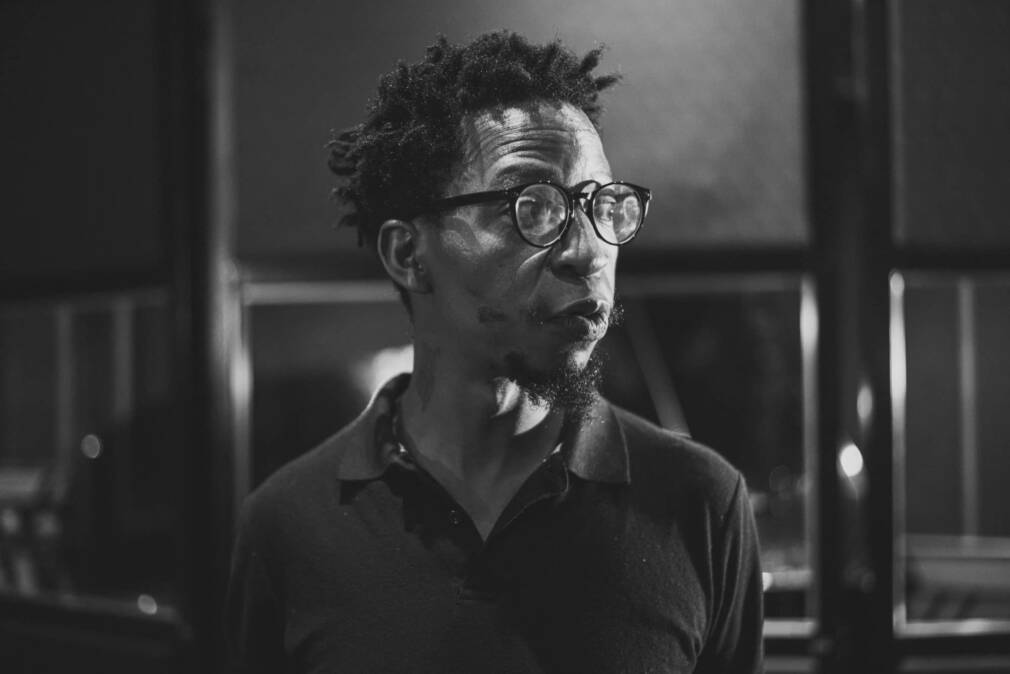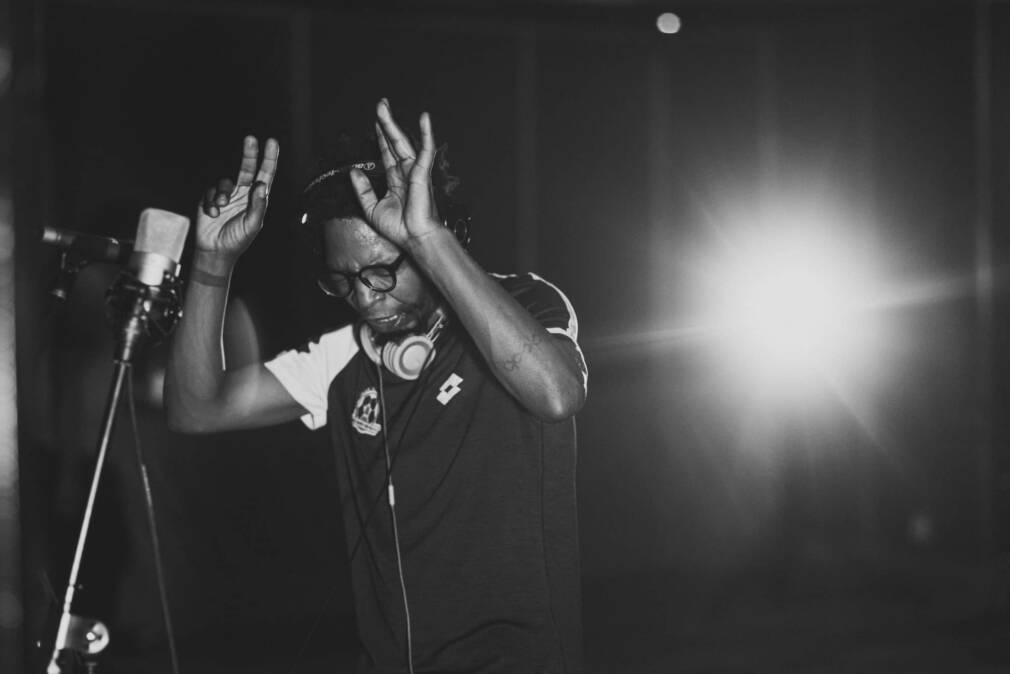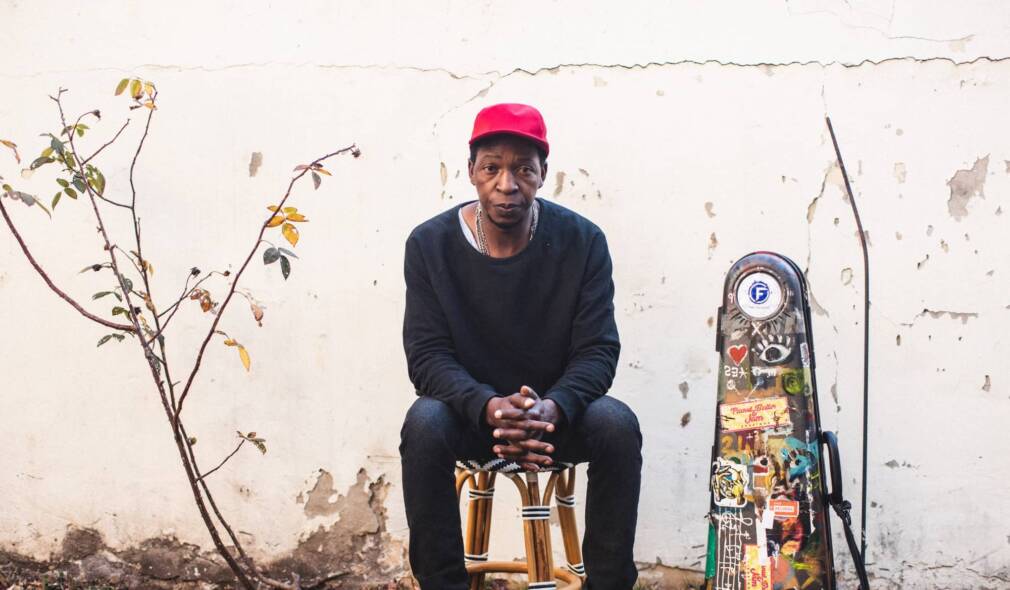The press release for South African trombonist, multi-instrumentalist and painter, Malcolm Jiyane’s album titled UMDALI slowly concludes where I would like to begin, with an acknowledgement of the conditions that produce this exemplary album, both the personal triumphs and the truth about the community logic that it takes for people like Jiyane to take up the space that they deserve. Mushroom Hour writes that “Jiyane’s own path to the realisation of UMDALI is nothing if not fraught with tests along the way. But his generosity of spirit means that the offering is more than merely one individual’s breakthrough.” This has been one of the most important messages from this album. The second message has to do with the importance of valuing vulnerability and feelings. Jiyane’s sonic proficiency isn’t simply in the technicalities of music making but also in the intentional disavowal of any obsession with precision. Instead, he has redefined a sort of perfection that is anchored in simplicity, displaying a profound confidence in our listening and our ability to centre our feelings and make space for whatever the music pulls out of us. The challenge is to choose this over the square tendencies that characterise how people sometimes listen to music and the obsession with the externalities of technique, structure and form, all of which, in true Jiyane genius, are never lost in spite of the music’s appeal for us to make space. I think about Jiyane’s music and the personal anecdotes about his life in the liner notes in the context of what type of performance arises when people are also given space to be complicated. Steve Kwena Mokoena refers to Jiyane as a painter in the liner notes and how his work has often expressed and held space for contradictions. He could paint “hunger, violence, and suffering” alongside the sentiment of “children playing, lovers kissing, people making love, people dancing at weddings…” Visual art and music seem to have been one of his ways of studying the world, of knowing both its tender and harsh realities. In all of this, the takeaway is space. He is not only celebrated for how he holds space as a visual artist but how this is extended in his music. He makes space for his bandmates to reach their own interpretations and he makes space for the listeners to do the same in his quiet yet felt presence.

My favourite track on this album is “Life esidimeni” for sonic and humanising pursuits. It references the traumatic death of approximately 143 people at a government psychiatric facility in Gauteng, South Africa, causes of death included starvation and neglect. Jiyane aptly sings “lendaba ibuhlungu” (this story is painful) most of us have probably felt this way about the disarming violence that unfolds in this country every day – a sort of numbing anaesthetic violence that black poor people are constantly subjected to. Even in the deprived responses or in moments of complete inability to process the tongue tying magnitude of pain, the body always remembers that harm was done. The body is a site of memory, it is present in the music and it speaks – by this I mean that sometimes people make music that brings into the world, the memory of sites often intentionally negated, cast away into the ether of nonexistence. Sometimes, songs like this are simply about the recognition of subjectivity and life, and are also attempts to reckon with the idea that we have lost the innocence of living as a result of the constant denial of the title of life and dignity. In isiXhosa language, “esidimeni” means “a place of dignity” – quite the opposite experience for those people with names and lives that ought to have mattered enough for them to be here with us today. For Africans, the naming of people and places is always a symbolic gesture of the hope for the existence of people and the trajectory of places. Life esidimeni is one of those places that has failed to live up to the hope of dignity, much like South Africa, a country with no name that continues to break the hearts of black people through neglect and structurally embodied starvation. It’s hard to listen to this track without feeling a loss of appetite, almost as if the heart is endlessly spilling into the stomach, filling it with grief – the kind of grief that the families, friends and communities of Life Esidimeni’s deceased patients feel every waking day, as the country goes on – trampling once again on the worn chests of poor black people. Jiyane gives dignity to this violation and generously consoles us through impossible tragedy. His compositional register picks through and adds on to stylistically South African harmonies and melodies – the familiarity of this sound feels like the gentle presence of comforters entering the home of the deceased to sing that one song that can arrest the pain of losing a loved one for just one moment. Credit is also due to the beautiful choral-like horn section with Brandon Ruiters on trumpet, Nhlanhla Mahlangu on alto saxophone and Tebogo Seitei on trumpet.
“Senzo seNkosi” is a tribute to Jiyane’s friend and member of the Tree-O, the late bassist Senzo Nxumalo and it’s a continuing reference to Jiyane’s initial composition in SPAZA’s UPRIZE!, in a track titled “Solomon, Tsietsi & Khotso”. It begins as a slow requiem held by alternating horns that play with an almost breathless, tender tone in search of the debilitating vulnerability that loss brings. For me, Jiyane’s music must be hailed for its descriptive capabilities and allegorical strength. “Senzo seNkosi” is a friend’s attempt to move through the stages of grief towards acceptance of a life that is the creator’s doing from beginning to end. The debut single “Umkhumbi ka Ma” is presented as an ode to mothers and borrows from the coolness of Herbie Hancock’s “Ostinato – Suite for Angela”. It is such an open reference – so beautifully spaced by Jiyane’s compositional style that ensures that there is room for everyone in the band to walk uncensored. This is a testament to the band’s incredible form and Jiyane’s confidence in it. The groove is enchantingly held by Ayanda Zalekile on electric bass and Lungile Kunene on drums. Gonste Makhene on percussion and Nkosinathi Mathunjwa on keys bring a decorative repertoire of sensual sounds. Ntate Gwangwa’s stroll is a mean dedication to a luminary late South African trombonist, Jonas Ngwangwa who was a close mentor to Jiyane. In a country with few trombonists, Ngwangwa’s exceptional style and unique interpretations of South African jazz as a composer and instrumentalist are a treasured legacy. Ntate Gwangwa’s stroll is full of texture, colour and a nostalgic attitude exemplary of the feeling and reaction in many black homes every time Gwangwa’s music plays.

Most tracks in this album are either a reference or an ode to the people who have influenced or held Jiyane in friendship, community and art. “Moshe” is no different – it pays homage to another South African prodigal figure who left us way too soon, pianist and stellar composer Moses Molelekwa. Jiyane and Molelekwa have many inventive commonalities, both of them have this incredible ability to merge something borrowed and something new without compromising their unique signature. If you are familiar with Molelekwa’s precious body of work, Moshe will only make you smile at the intelligent arrangement that Jiyane produces here. Jiyane’s sensibility as a pianist (too) reflects in his understanding of those infamous Molelekwa-like rhythmic palettes, gorgeous melodies and hymn-like basslines. Nkosinathi Mathunjwa on piano delivers all of this with perfect feeling and honesty. On trombone, Jiyane moves with a staggering pursuit for Molelekwa’s world of sound in his absence, filling this gaping hole that some of us felt in the loss of his young life. Jiyane gives us just over ten minutes into Molelekwa’s vortex and it must be said that not many are capable of this audacious task.
Malcolm Jiyane is second to none – most of us who have been exposed to his art have known this and it’s time for the many worlds out there to learn the truth that we have been so fortunate to bask in. The clarity of his band is not only a testament of his creative energy as a bandleader but of the magnificent individual talent that makes up Malcolm Jiyane’s Tree-O. On the cover of this beautiful album is Sierra Leone, Jiyane’s daughter – I hope she grows up with the confidence of knowing her dad loved her – and perhaps take as a lesson from this album that we are not merely products of our tragic environment but we are also the generosity of people, spaces, ideas, traditions and above all the generosity of the creator, UMDALI.
UMDALI by Malcolm Jiyane, out on all platforms.





